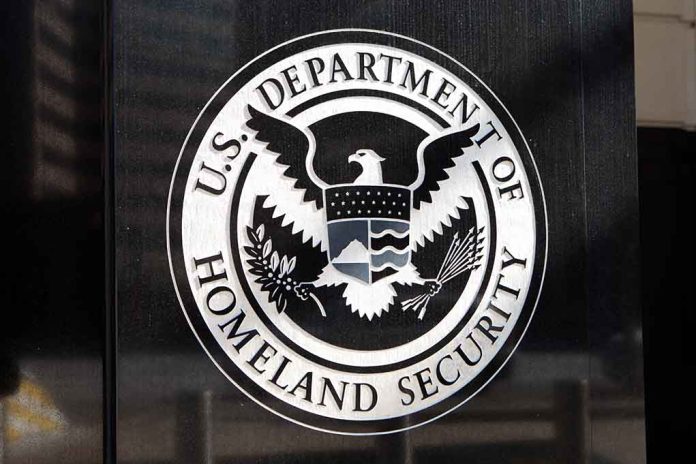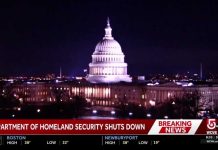
California Senator Alex Padilla was forcibly handcuffed and removed from a DHS press conference after challenging Secretary Kristi Noem, exposing a dramatic clash that reveals deep divides in America’s approach to immigration enforcement.
Key Takeaways
- Democratic Senator Alex Padilla was forcibly removed and handcuffed at Homeland Security Secretary Kristi Noem’s press conference in Los Angeles while attempting to ask questions about immigration enforcement.
- The Department of Homeland Security claimed Padilla engaged in “disrespectful political theatre” and failed to comply with officers’ commands, while Padilla maintained he identified himself as a senator.
- The incident occurred amid controversial ICE raids in Los Angeles that sparked protests, with President Trump deploying National Guard and Marines to support operations.
- Politicians split along party lines in their response, with Democrats calling it a “sickening disgrace” and the White House accusing Padilla of seeking attention rather than answers.
- A federal judge has ordered former President Trump to return California National Guard to state control, highlighting tensions between state and federal powers over immigration enforcement.
Dramatic Confrontation Unfolds as Senator Padilla Challenges DHS Secretary
In a scene that perfectly encapsulates the theatrical nature of today’s political landscape, Senator Alex Padilla found himself forcibly removed and handcuffed at a press conference held by Homeland Security Secretary Kristi Noem in Los Angeles. Video footage shows Padilla being restrained by multiple men identified as Noem’s security detail after he attempted to interrupt the conference with questions about immigration enforcement. The confrontation quickly escalated when Padilla repeatedly called out, identifying himself as a U.S. Senator seeking answers.
“I’m Senator Alex Padilla, I have questions for the secretary!” Padilla shouted before being restrained by security personnel, as captured in multiple videos of the incident. Despite his protests, Padilla was physically removed from the venue, handcuffed, and forced to the ground according to statements from his office. While Padilla was not ultimately arrested or detained, the heavy-handed response to an elected official has sparked outrage among Democrats and raised serious questions about the administration’s approach to dissenting voices.
Political Theater or Legitimate Oversight?
The Department of Homeland Security wasted no time framing the incident as pure political theater, claiming Padilla did not properly identify himself and failed to comply with officers’ commands. White House Press Secretary Abigail Jackson reinforced this narrative, stating bluntly, “Padilla didn’t want answers; he wanted attention.” This characterization attempts to diminish Padilla’s actions as mere grandstanding rather than legitimate congressional oversight of executive branch activities—a core function of senators on relevant committees.
“If they can handcuff a U.S. Senator for asking a question, imagine what they will do to you,” warned California Governor Gavin Newsom in a statement that encapsulates the fears many Democrats have expressed about the Trump administration’s approach to immigration enforcement.
Secretary Noem later attempted to smooth over the incident, stating, “When I leave here I’ll have a conversation with him, but I think everyone would agree that wasn’t appropriate.” The two did indeed meet for approximately 15 minutes following the incident, though details of their discussion have not been made public. The confrontation comes at a time of heightened tensions in Los Angeles, where ICE raids backed by National Guard troops have sparked protests across the city.
Broader Implications for Immigration Enforcement
The backdrop to this dramatic confrontation is President Trump’s aggressive immigration enforcement strategy, which has included deploying both National Guard and Marine forces to support ICE operations in major cities. These actions have sparked significant protests in Los Angeles and other metropolitan areas with large immigrant populations. Noem’s press conference was specifically intended to highlight the results of these controversial operations, making Padilla’s interruption particularly unwelcome from the administration’s perspective.
“We are staying here to liberate the city from the socialists and the burdensome leadership that this governor and that this mayor have placed on this country,” Secretary Noem declared during her press conference, framing the federal immigration enforcement actions as a necessary intervention against failing Democratic leadership.
Adding another layer of complexity to this situation, a federal judge has recently ordered President Trump to return the California National Guard to state control. This ruling represents a significant check on federal authority and underscores the contentious nature of using federal resources for immigration enforcement without state approval. The decision has far-reaching implications for the relationship between state and federal powers, particularly when it comes to emergency response and immigration enforcement operations.
Party Lines Sharply Drawn in Response
Reactions to the incident have fallen predictably along party lines, with Democratic colleagues rushing to Padilla’s defense while Republicans largely supported the administration’s actions. Senate Minority Leader Chuck Schumer expressed his disgust with the treatment of his colleague, stating, “Watching this video sickened my stomach, the manhandling of a United States Senator, Senator Padilla.” The incident has only deepened the partisan divide over immigration policy and appropriate conduct in political discourse.
Former Vice President Kamala Harris defended Padilla by emphasizing his role as a representative seeking answers for his constituents, particularly on issues directly affecting California. Meanwhile, LA Mayor Karen Bass and Governor Newsom both issued statements condemning the incident and calling for Republican leadership to address what they view as an unacceptable breach of political norms. The stark contrast in reactions demonstrates the fundamental disagreement between parties not just on immigration policy, but on the very nature of political discourse and oversight in America.
As this story continues to develop, one thing remains clear: Senator Padilla’s theatrical confrontation with Secretary Noem has accomplished exactly what political theater is designed to do—capture attention and force a conversation about contentious policies that might otherwise proceed without public scrutiny. Whether this will translate into meaningful policy change or simply reinforce existing partisan divides remains to be seen.




